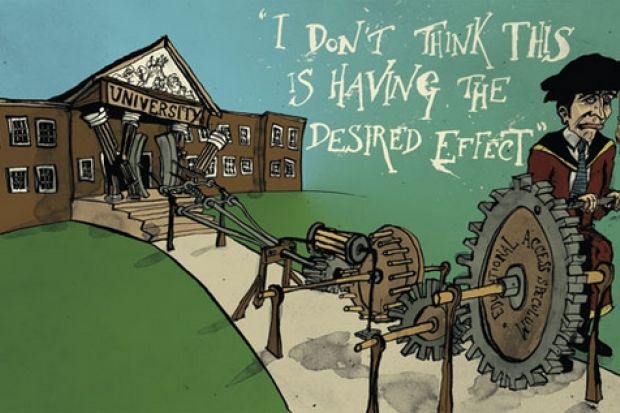Many of those who took to the streets over the past few weeks did so because they cared about access to higher education. They probably did not realise, though, that it was not just the prospect of higher tuition fees that will restrict access. Some of the government's less emotive policies are going to have an equally destructive effect.
The government has repeatedly claimed that universities that wish to charge more than £6,000 a year will be forced to take extra measures in order to ensure that under-represented groups are not discouraged from attending. It is the universities' responsibility, it has said, to "lead" on widening access to higher education.
This argument was greeted with much scepticism when it was made by David Willetts, the universities and science minister, and Nick Clegg, the deputy prime minister, in early November. It looked even more questionable when it was announced in late November that Aimhigher - the partnership of higher education institutions, further education colleges and local authorities that supports the progression of learners to higher education - will be abolished next year. It now appears to be untenable with the release in December of the draft guidance from the Department for Business, Innovation and Skills to the Office for Fair Access (Offa), which lays out what the new, "beefed-up" access agreements will look like. Existing access agreements lack both detail and concrete targets that hold institutions to account. The draft guidance promises nothing to change this.
There are three glaring omissions that will make any new agreements as impotent as their predecessors. First, universities are not required to specify a minimum investment in outreach access work. This decision displays striking naivety. Who would expect universities to maintain, never mind increase, investment in access when they are experiencing cuts in their budgets that threaten subjects, faculties and - for some - their very existence? At Aimhigher, we have already seen reductions in access investment at numerous universities across the country.
Second, there is no commitment to increase investment in Offa itself. It has to have the resources to scrutinise properly. We will know the watchdog is working when a visit from Offa has the same impact on a university as a visit from Ofsted has on a school. Being effective is not cheap, though. Ofsted costs more than £200 million a year, Offa less than £500,000.
Finally, the new guidance should include a statutory system of Offa-led accreditation and quality marks to ensure universities are delivering quality-assured and, above all, impartial outreach activities. The government has made welcome steps to professionalise careers advice in this way. It should do the same for university outreach.
The ministers believe it self-evident that universities should take the lead on widening access. But the evidence suggests that it is something they neither want, nor are able to deliver. It is and always will be a political fight for those who believe in access to get it on institutional agendas. Proficiency in access work is a weak driver of individual career progression or departmental performance ratings. Most importantly, it does not feature in the variety of league tables so crucial in higher education today.
However, even if they wanted to, universities could not "lead" on widening access. Most of those who need help to make it to higher education are not under the aegis of universities - they are at school or college. Michael Gove, the education secretary, is right for once, when he says that schools have the most important role to play in widening access. The abolition of Aimhigher will make it virtually impossible for universities to deliver an expanded access offer.
Aimhigher provided an infrastructure of trained staff in more than 3,000 schools and colleges, and senior strategic commitment from schools to higher education access. Without Aimhigher, it will be only the schools with the fewest disadvantaged learners, under the least pressure from Ofsted, that maintain the infrastructure essential for outreach work to happen.
Universities need tougher, not weaker, access regulation. Schools and colleges need funding and support to participate in access work. Higher fees will be accompanied by less outreach. Participation by under-represented groups will almost certainly fall. The protesters are right: the government is walking away from its access commitments. Now, they are taking the universities with them.
Register to continue
Why register?
- Registration is free and only takes a moment
- Once registered, you can read 3 articles a month
- Sign up for our newsletter
Subscribe
Or subscribe for unlimited access to:
- Unlimited access to news, views, insights & reviews
- Digital editions
- Digital access to THE’s university and college rankings analysis
Already registered or a current subscriber? Login
